Google’s “AI Mode”: A Shift in Online Interaction and Its Implications for the Web Ecosystem
The advent of AI-driven features in search engines has marked a significant turning point in how users access and engage with online information. What initially appeared as a helpful evolution—such as AI Overviews—has rapidly evolved into a comprehensive redefinition of the user experience, with profound implications for website traffic, content creators, and the broader open web.
The Evolving Landscape of Search Results
Recent developments indicate a trend toward reducing the visibility and accessibility of external links within Google’s search results. AI Overviews, which once included links to original sources, now often push these references below the fold or omit them entirely in AI Mode. This shift means users are less frequently redirected to individual websites, as Google’s AI aims to answer queries directly within its interface.
Google’s Strategy: Keeping Users Within Its Ecosystem
By minimizing outbound links, Google appears intent on maintaining user engagement within its own environment. Instead of clicking through to external sites, users are encouraged to ask follow-up questions, prompting ongoing interactions with the AI. While this may streamline the user experience and provide quick answers, it also consolidates the flow of information within Google’s domain.
Impact on the Open Web and Content Creators
This shift has significant consequences for website owners and digital marketers. Reduced traffic from organic search means less exposure for individual sites, potentially jeopardizing revenue streams and content reach. As fewer users click through to external sources, the long-term vitality of the open web—where diverse voices and independent content thrive—may be diminished.
A Double-Edged Sword: Convenience Versus Web Integrity
The benefits of AI Mode—such as cleaner, more concise summaries—are evident, especially in an era overwhelmed by digital clutter. However, these advantages come at a cost. Much of the content integrated into these AI models is scraped from existing websites, which are consequently bypassed or dismissed. This raises questions about the sustainability and fairness of relying heavily on scraped content without appropriately compensating or crediting original creators.
From Innovation to Extraction
This evolving scenario is more than just technological progress; it represents a form of data extraction and control. Google appears to be attempting to dominate both the questions users ask and the answers they receive, potentially reshaping the web’s information landscape to favor its algorithms and AI systems over independent sources.
Strategic Responses for Content Entrepreneurs
For entrepreneurs and content creators, these changes underscore

